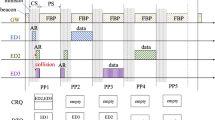Abstract
Random Access (RA) approaches in satellite networks may limit the achievable energy efficiency due to the random nature of channel access, especially when hand-held terminals must operate with a very low signal-to-noise ratio. This paper shows that Network Diversity Multiple Access (NDMA) principles can be used to provide an energy efficient RA scheme which satisfies some Quality of Service requirements. The paper proposes performance models for the throughput and energy efficiency considering a finite queue at each terminal and multiple packet retransmissions. Optimal parameters are calculated to maximize the energy efficiency while satisfying the throughput and error requirements, taking into account the bit-rate constraint. The proposed system’s performance is evaluated for a Single-Carrier with Frequency Domain Equalization (SC-FDE) scheme at the uplink. Results show that the proposed system is energy efficient and can provide sustained bandwidth.
Access this chapter
Tax calculation will be finalised at checkout
Purchases are for personal use only
Preview
Unable to display preview. Download preview PDF.
Similar content being viewed by others
References
Madueño, M., Vidal, J.: Joint PHY-MAC layer design of the broadcast protocol in ad-hoc networks. Journal on Selected Areas in Comm. (2005)
Peyravi, H.: Medium Access Control Protocols Performance in Satellite Communications. IEEE Comm. Mag. 37, 62–71 (1999)
De Gaudenzi, R., Herrero, O.: Advances in Random Access Protocols for Satellite Networks. In: IEEE IWSSC 2009, pp. 331–336 (2009)
Ganhão, F., Bernardo, L., Dinis, R., Barros, G., Santos, E., Furtado, A., Oliveira, R., Pinto, P.: Energy-Efficient QoS Provisioning in Demand Assigned Satellite NDMA Schemes. In: IEEE ICCCN 2012 (2012)
Ganhão, F., Dinis, R., Bernardo, L., Oliveira, R.: Analytical BER and PER Performance of Frequency-Domain Diversity Combining, Multipacket Detection and Hybrid Schemes. IEEE Trans. on Comm. 60, 2353–2362 (2009)
Bolch, G., Greiner, S., deMeer, H., Tivedi, K.: Queueing Networks and Markov Chains: Modeling and Performance Evaluation with Computer Science Applications. John Wiley & Sons (1998)
Dinis, R., Montezuma, P., Bernardo, L., Oliveira, R., Pereira, M., Pinto, P.: Frequency-domain multipacket detection: a high throughput technique for SC-FDE systems. IEEE Trans. on Wireless Comm. 8, 3798–3807 (2009)
Author information
Authors and Affiliations
Editor information
Editors and Affiliations
Rights and permissions
Copyright information
© 2013 Springer-Verlag Berlin Heidelberg
About this paper
Cite this paper
Vieira, J. et al. (2013). Random Access NDMA MAC Protocols for Satellite Networks. In: Balandin, S., Andreev, S., Koucheryavy, Y. (eds) Internet of Things, Smart Spaces, and Next Generation Networking. ruSMART NEW2AN 2013 2013. Lecture Notes in Computer Science, vol 8121. Springer, Berlin, Heidelberg. https://doi.org/10.1007/978-3-642-40316-3_38
Download citation
DOI: https://doi.org/10.1007/978-3-642-40316-3_38
Publisher Name: Springer, Berlin, Heidelberg
Print ISBN: 978-3-642-40315-6
Online ISBN: 978-3-642-40316-3
eBook Packages: Computer ScienceComputer Science (R0)




